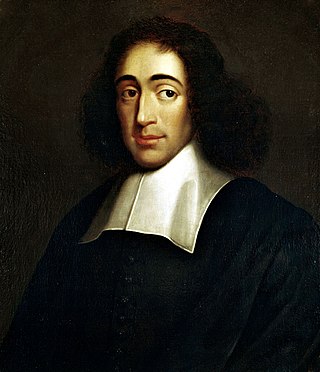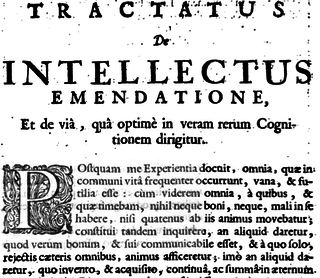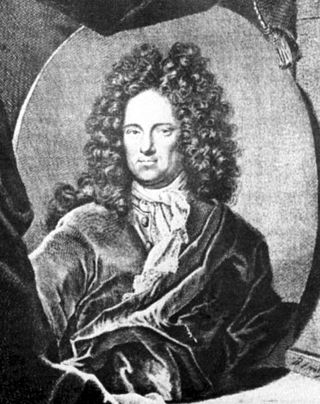
Baruch (de) Spinoza, also known under his Latinized pen name Benedictus de Spinoza, was a Dutch philosopher of Portuguese-Jewish origin. As a forerunner of the Age of Enlightenment, Spinoza significantly influenced modern biblical criticism, 17th-century rationalism, and Dutch intellectual culture, establishing himself as one of the most important and radical philosophers of the early modern period. Influenced by Stoicism, Maimonides, René Descartes, and heterodox Christian thinkers, Spinoza was a leading philosopher of the Dutch Golden Age.
Q.E.D. or QED is an initialism of the Latin phrase quod erat demonstrandum, meaning "that which was to be demonstrated". Literally it states "what was to be shown". Traditionally, the abbreviation is placed at the end of mathematical proofs and philosophical arguments in print publications, to indicate that the proof or the argument is complete.
Baruch is a masculine name among Jews used from Biblical times to the present, which is sometimes used as surname. It is also found, though more rarely, among Christians—particularly among Protestants who use Old Testament names.

The Tractatus Theologico-Politicus (TTP) or Theologico-Political Treatise, is a 1670 work of philosophy written in Latin by the Dutch philosopher Benedictus Spinoza (1632–1677). The book was one of the most important and controversial texts of the early modern period. Its aim was "to liberate the individual from bondage to superstition and ecclesiastical authority." In it, Spinoza expounds his views on contemporary Jewish and Christian religion and critically analyses the Bible, especially the Old Testament, which underlies both. He argues what the best roles for state and religion should be and concludes that a degree of democracy and freedom of speech and religion works best, such as in Amsterdam, while the state remains paramount within reason. The goal of the state is to guarantee the freedom of citizens. Religious leaders should not interfere in politics. Spinoza interrupted his writing of his magnum opus, the Ethics, to respond to the increasing intolerance in the Dutch Republic, directly challenging religious authorities and their power over freedom of thought. He published the work anonymously, in Latin, rightly anticipating harsh criticism and vigorous attempts by religious leaders and conservative secular authorities to suppress his work entirely. He halted the publication of a Dutch translation. One described it as being "Forged in hell by the apostate Jew working together with the devil". The work has been characterized as "one of the most significant events in European intellectual history", laying the groundwork for ideas about liberalism, secularism, and democracy.
Benedictus, Latin for "blessed" or "a blessed person", may refer to:
Affect is a concept, used in the philosophy of Baruch Spinoza and elaborated by Henri Bergson, Gilles Deleuze and Félix Guattari, that places emphasis on bodily or embodied experience. The word affect takes on a different meaning in psychology and other fields.

In the philosophy of Baruch Spinoza, conatus is an innate inclination of a thing to continue to exist and enhance itself. This thing may be mind, matter, or a combination of both, and is often associated with God's will in a pantheist view of nature. The conatus may refer to the instinctive will to live of living organisms or to various metaphysical theories of motion and inertia. Today, conatus is rarely used in the technical sense, since classical mechanics uses concepts such as inertia and conservation of momentum that have superseded it. It has, however, been a notable influence on later thinkers such as Arthur Schopenhauer and Friedrich Nietzsche.

Willem van Blijenbergh (1632–1696) was a Dutch grain broker and amateur Calvinist theologian. He was born and lived in Dordrecht. He engaged in philosophical correspondence with Baruch Spinoza regarding the problem of evil. Their correspondence consisted of four letters each, written between December 1664 to June 1665. Blijenbergh visited Spinoza at his home in June, after which their correspondence ended.
Heidi M. Ravven is the Bates and Benjamin Professor of Classical and Religious Studies at Hamilton College, where she has taught her specialization, Jewish Philosophy, and general Jewish Studies since 1983. She is a Fellow in Neurophilosophy of the Integrative Neurosciences Research Program, which is co-directed by Vilayanur Ramachandran and Kjell Fuxe. She has been appointed Visiting Professor of Philosophy in the School of Marxism at Northeast Normal University, Changchun, China, for 2017-20.
Benoît is a French male given name. It is less frequently spelled Benoist. The name comes from the Latin word benedictus, which means "blessed", equivalent in meaning to Bénédicte or the English name Benedict. A female derivative of the name is Benoîte.
In philosophy and religion, the passions are understood to be the emotions, instincts and desires that drive a human being. Different philosophical traditions hold different views about the passions. The philosophical notion of passion, in contrast, is generally identified with instinctually driven emotional states regarded, in many ancient philosophies and religious doctrines, as being the basis for deadly sins and seen as leading to various social and spiritual ills. In Western philosophical traditions, the passions are often placed in opposition to reason.

Tractatus de Intellectus Emendatione is an unfinished work of philosophy by the seventeenth-century philosopher Baruch Spinoza, published posthumously in 1677.
Bento, a diminutive of Benedito is a Portuguese name meaning Benedict based on Late Latin Benedictus, "blessed", "well spoken of". It can be used as a given name or a surname.

Ehrenfried Walther von Tschirnhaus was a German mathematician, physicist, physician, and philosopher. He introduced the Tschirnhaus transformation and is considered by some to have been the inventor of European porcelain, an invention long accredited to Johann Friedrich Böttger but others claim porcelain had been made by English manufacturers at an even earlier date.

Lodewijk Meyer was a Dutch physician, classical scholar, translator, lexicographer, and playwright. He was a radical intellectual and one of the more prominent members of the circle around the philosopher Benedictus de Spinoza.
Benedict is a masculine given name of Latin origin, meaning "blessed". Etymologically, it is derived from the Latin words bene ('good') and dicte ('speak'), i.e. "well spoken". The name was borne by Saint Benedict of Nursia (480–547), often called the founder of Western Christian monasticism.
Bennet is an English language surname and, less commonly, a given name. Alternative spellings include Bennett, Benett and Benet.

The Epistolae are the correspondence of the Dutch philosopher Benedictus de Spinoza with a number of well-known learned men and with Spinoza's admirers, which Spinoza's followers in Amsterdam published after his death in the Opera Posthuma.






